初中形容词及副词用法总结及练习
初中的归纳常见的形容词与副词的用法总结
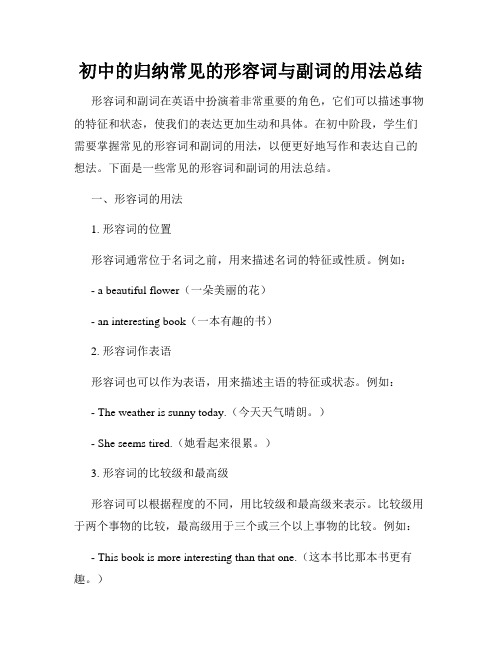
初中的归纳常见的形容词与副词的用法总结形容词和副词在英语中扮演着非常重要的角色,它们可以描述事物的特征和状态,使我们的表达更加生动和具体。
在初中阶段,学生们需要掌握常见的形容词和副词的用法,以便更好地写作和表达自己的想法。
下面是一些常见的形容词和副词的用法总结。
一、形容词的用法1. 形容词的位置形容词通常位于名词之前,用来描述名词的特征或性质。
例如:- a beautiful flower(一朵美丽的花)- an interesting book(一本有趣的书)2. 形容词作表语形容词也可以作为表语,用来描述主语的特征或状态。
例如:- The weather is sunny today.(今天天气晴朗。
)- She seems tired.(她看起来很累。
)3. 形容词的比较级和最高级形容词可以根据程度的不同,用比较级和最高级来表示。
比较级用于两个事物的比较,最高级用于三个或三个以上事物的比较。
例如:- This book is more interesting than that one.(这本书比那本书更有趣。
)- English is the most widely spoken language in the world.(英语是世界上使用最广泛的语言。
)二、副词的用法1. 副词的位置副词通常位于动词之前,用来修饰动作的方式、程度或频率。
例如:- He runs fast.(他跑得快。
)- She speaks English fluently.(她流利地讲英语。
)2. 副词作状语副词可以作为状语,用来描述动词、形容词或其他副词的方式、程度或频率。
例如:- He sings loudly.(他大声唱歌。
)- The car is too expensive.(这辆车太贵了。
)3. 副词的比较级和最高级副词的比较级和最高级的形式和用法与形容词类似。
例如:- She runs faster than her brother.(她跑得比她哥哥快。
初一英语形容词和副词语法知识总结(讲解+考点+综合练习):形容词和副词
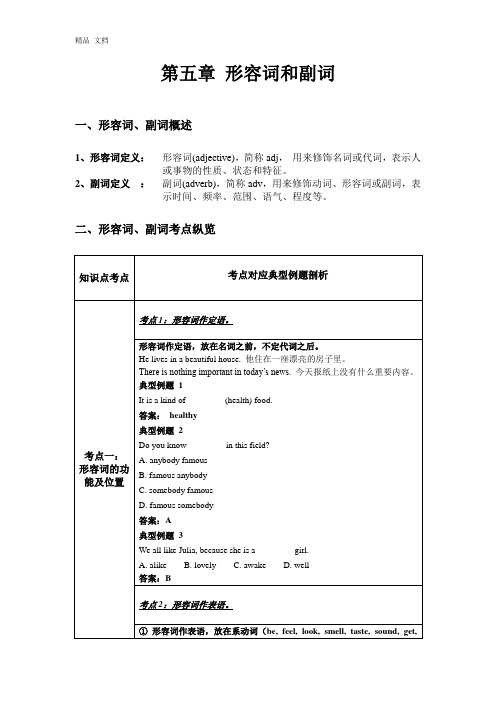
第五章形容词和副词一、形容词、副词概述1、形容词定义:形容词(adjective),简称adj,用来修饰名词或代词,表示人或事物的性质、状态和特征。
2、副词定义:副词(adverb),简称adv,用来修饰动词、形容词或副词,表示时间、频率、范围、语气、程度等。
二、形容词、副词考点纵览三、综合练习( )1. –If you don’t like the red coat, how about the green one?–OK, but do you have _______ size in green? This one is a bit small for me.A. a bigB. a biggerC. the bigD. the bigger( )2. –Mum, I think I’m _______ to get back to school.–Not really, my dear. You’d better stay at home for anoth er day or two.A. so wellB. so goodC. well enoughD. good enough ( )3. –What delicious cakes! –They will taste _______ with butter.A. goodB. betterC. badD. worse( )4. –Mr. Zhou , of all the students in our group, who lives _______ ?–I think Li Lei does.A. farB. fartherC. farthestD. the farther( )5. With a history of more than 1,400 years, ZhaoZhou Bridge is the _______ stone arch bridge in the world .A. oldB. olderC. oldestD. elder( )6. Bob never does him homework _______ Mary. He makes lots of mistakes.A. so careful asB. as carefully asC. carefully asD. as careful as ( )7. A: How can I speak English _______ you?B: You’d better speak more, I think.A. as good asB. more thanC. as well asD. as much as( )8. Your English is good. I’ll try my best to speak it as _______you do.A. clearly asB. clear asC. clearer thanD. more clearly ( )9. –Is your mother badly ill?–No, _______ , only a little cold.A. serious anythingB. serious nothingC. nothing seriousD. anything serious( )10. I’m not sure if I’m going to Tim’s party; I may go to the concert _______ .A. onlyB. insteadC. earlyD. late( )11. Although they are brothers, they are the _______ opposite of one another.A. veryB. justC. fewD. little( )12. The new Bright Restaurant is _______ than the old one. Moore and more people like to eat there.A. goodB. betterC. badD. worse( )13. Wang Ping does _______ in physics that I missed the first class.A. badlyB. Most badlyC. worseD. worst( )14. I got up so _______ this morning that I missed the first class.A. earlyB. lateC. quietlyD. neatly( )15. –Do you enjoy traveling by plane?–No. It’s _______ expensive.A. much moreB. more muchC. too muchD. much too( )16. I’m afraid the headmaster is _______ busy to meet the visitors.A. too muchB. much tooC. so muchD. much too( )17. How beautifully she sings! I’ve never heard _______ .A. the better voiceB. a good voiceC. the best voiceD. a better voice( )18. You do well in your lessons. I’m _______ you will pass the exam.A. sureB. afraidC. sadD. sorry( )19. –Who is _______ in your class?–Fred.A. tallB. tallerC. tallestD. the tallest( )20. –What do you think of the football match?–Wonderful! The Chinese football team has never played _______ .A. betterB. bestC. worseD. worst( )21. The population of China is _____ than _____ of any other country in the world.A. larger , the oneB. more , thatC. larger , thatD. more , the one ( )22. There is much wine here, but _______ people want to drink it.A. manyB. a littleC. fewD. a few( )23. People speak ______ of the film Not One Less. It is really necessary for every child to go to school.A. loudB. loudlyC. highD. highly( )24. She always finishes her homework on time. She ______ leaves it for tomorrow.A. alwaysB. neverC. usuallyD. sometimes( )25. The football match was _______, so the boys were _______ about it.A. excited , excitingB. exciting, excitedC. excited , excitedD. exciting , exciting( )26. Playing table tennis isn’t difficult. You can learn it _______.A. easyB. easilyC. quickD. hardly( )27. We Chinese always put our family name _______.A. lastB. nearlyC. firstD. in the middle ( )28. This kind of T-shirt look _______ and sells _______ in the market.A. nice, goodB. well , wellC. nice , wellD. good , nice( )29. The light in the room wasn’t _______ for me to read.A. brightly enoughB. enough brightlyC. enough brightD. bright enough( )30. –Look, this digital camera is really cheap! It’s only five hundred yuan.–The _______ , the better. I’m short _______ money, you know.A. cheaper , ofB. cheap, forC. expensive , ofD. more expensive , for( )31. Which subject do you like _______ , math, Chinese or English?A. betterB. bestC. wellD. very much( )32. _______ little water is not enough for _______ many people.A. Such , soB. So , soC. Such , suchD. So , such( )33. English is spoken by _______ people.A. a lotB. much manyC. a large number ofD. a great deal of ( )34. –Isn’t that Mary?–Yes, she always has a(an) _______ smile on her face.A. aloneB. kindlyC. ownD. friendly( )35. –Do you prefer music to drawing?–No. I like drawing _______.A. wellB. mostC. betterD. best( )36. Since China has been a member of the WTO, English is ______ useful than before.A. moreB. mostC. muchD. very( )37. Can you speak a little louder? I can _______ hear you.A. hardB. reallyC. hardlyD. clearly( )38. China has a _______ population and long history.A. manyB. largeC. muchD. big( )39. Do you have _______ to say?A. important anythingB. anything importantC. important somethingD. something important( )40. Which is _______ , English or Chinese?A. interestingB. interestingerC. more interestingD. most interesting( )41. –The TV programme is boring. Shall we play chess intead?–All right. That is _______ than watching a boring programme.A. very goodB. much goodC. very betterD. much better( )42. –Mum, could you buy me a dress like this?–Certainly, we can buy _______ one than this, but _______ this.A. a better, better thanB. a worse , as good asC. a cheaper , as good asD. a more important , not as good as ( )43. Let’s enjoy the song Yesterday Once More. It sounds _______.A. wellB. sadlyC. niceD. bad( )44. –Is the physics problem _______ ?–Yes. I can work it out _______.A. easy , easilyB. easy, easyC. easily , easyD. easily , easily ( )45. Hainan is a very large island. It’s the second _______ island in China.A. largeB. largerC. largerD. most large( )46. What a _______ cough! You seem _______ ill.A. terrible, terriblyB. terribly , terribleC. terrible , terribleD. terribly , terribly ( )47. I’m not sure whether Mary can sing _______ Mabel.A. as well asB. as good asC. so good asD. as better as( )48. Chinese is _______ more difficult than English.A. mostB. veryC. manyD. much( )49. The _______ old man told his son to be a good boy.A. diedB. deadC. dyingD. death( )50. Today my sister is feeling _______ to go to the factory.A. enough goodB. good enoughC. well enoughD. enough well参考答案精品文档1—5 B C B C C6—10 B C A C B11—15 A B D B D16—20 B D A D A21—25 C C D B B26—30 B C C D A31—35 B B C D C36—40 A C B B C文档说明(Word文档可以删除编辑)专注于精品文档:中考、高考、数学语文英语试卷、高中复习题目、小学试卷教案合同协议施工组织设计、期中、期末等测试,本文档目的是为了节省读者的工作时间,提高读者的工作效率,读者可以放心下载文档进行编辑使用.文档来源网络改编,审核有可能疏忽,如果有错误或侵权,请联系本店马上删除。
2022年中考英语语法专题之形容词和副词的用法(含练习和答案)
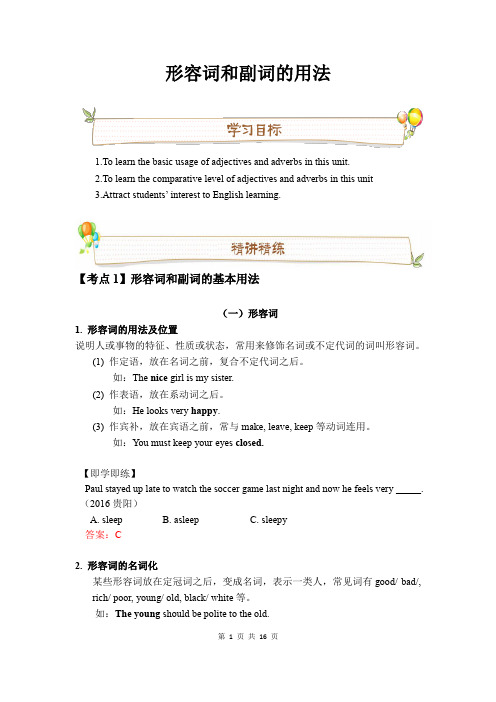
形容词和副词的用法1.To learn the basic usage of adjectives and adverbs in this unit.2.To learn the comparative level of adjectives and adverbs in this unit3.Attract students’ interest to English learning.【考点1】形容词和副词的基本用法(一)形容词1. 形容词的用法及位置说明人或事物的特征、性质或状态,常用来修饰名词或不定代词的词叫形容词。
(1) 作定语,放在名词之前,复合不定代词之后。
如:The nice girl is my sister.(2) 作表语,放在系动词之后。
如:He looks very happy.(3) 作宾补,放在宾语之前,常与make, leave, keep等动词连用。
如:You must keep your eyes closed.【即学即练】Paul stayed up late to watch the soccer game last night and now he feels very _____.(2016贵阳)A. sleepB. asleepC. sleepy答案:C2. 形容词的名词化某些形容词放在定冠词之后,变成名词,表示一类人,常见词有good/ bad/, rich/ poor, young/ old, black/ white等。
如:The young should be polite to the old.3. 形容词的顺序当名词由两个以上的形容词(包括一些具有形容词功能的限定词)修饰时,这些词的顺序通常遵循一定的规则,一般不得随意调换,也不能依照汉语的意思去排列。
通常可按下面的次序排列:(1) 限定词,包括:冠词、指示代词、形容词性物主代词、名词所有格、数词等。
初中英语语法---形容词和副词含练习

专题复习---形容词和副词〔一〕一、形容词的构成及其用法用以修饰名词等表示人和事物的性质、特征的词叫形容词。
它在句中可以充当定语、表语和宾语补足语,一般放在所修饰词的前面。
Eg. Those big moon cakes are delicious. (作表语)Eg. There are many beautiful flowers in the park. (作定语)1.修饰词尾为-body/-one; -thing不定代词时,必须放在其后。
Eg. There’s nothing wrong with my bike.Eg. Please give me something delicious to eat.Eg. Anybody clever can’t do such stupid things.2.表示长、宽、高、深或年龄的形容词的常用构造:数词+名词+形容词12 years old/ 8meters long/ 3 meters wide/ 100 kilometers high/ 1.8meters tallEg. It’s a river 6 meters deep.Eg. That’s a road 300 kilometers long.Eg. The young man is 1.8 meters tall.3.系动词〔look, sound, smell, taste, feel〕之后要接形容词Eg. The soup tastes nice.Eg. They all looked very happy after hearing the good news.4.–ing形容词和-ed形容词的区别-ed形容词通常用来形容人,而-ing形容词通常用来形容事或物如:disappointed/e*cited/interested/surprised/bored/amazed/rela*ed (*人)感到失望/兴奋/有趣/奇怪/厌烦/震惊/放松disappointing/e*citing/interesting/surprising/boring/amazing /rela*ing〔*事〕令人失望的/兴奋的/有趣的/奇怪的/厌烦的/震惊的/放松的5.“the +局部形容词〞表示“一类人〞the young the old the rich the poor二、副词的构成和用法。
形容词和副词用法的详细归纳及练习(附答案)
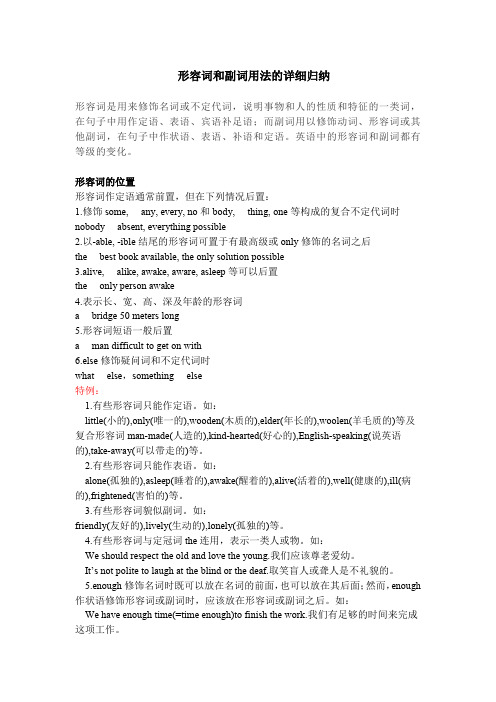
2019-2020学年度中图版历史九年级下册第三单元第二次世界大战第2 课大战的扩大与转折复习特训第十三篇第1题【单选题】20世纪上半期发生的两次世界大战给人类文明带来了空前的浩劫,深刻影响着人类社会的发展进程。
以下关于两次世界大战共同点的表述,不正确的是( )A、原因都是帝国主义政治经济发展不平衡B、都客观上推动了科学技术的迅速发展C、性质都是帝国主义战争D、战后都形成了新的世界格局【答案】:【解析】:第2题【单选题】第二次世界大战后期,为了尽快打败法西斯解决战后重大问题而召开的国际会议是( )A、德黑兰会议B、雅尔塔会议C、开罗会议D、波茨坦会议【答案】:【解析】:第3题【单选题】如图所示战役的历史作用是( )A、标志着第二次世界大战爆发B、宣告国际反法西斯联盟成立C、成为世界反法西斯战争的转折点D、开辟了欧洲第二战场【答案】:【解析】:第4题【单选题】第二次世界大战前,英法出卖别国利益换来自己短暂的“和平”的事件是( )A、慕尼黑会议B、国会纵火案C、华盛顿会议D、珍珠港事件【答案】:【解析】:第5题【单选题】学习历史,必须分清哪些是史实,哪些是观点。
下列表述中,属于“观点”的是( )A、哥伦布发现美洲新大陆,欧洲对美洲的征服拉开了序幕B、1916年月2月,德、法双方在凡尔登展开血战C、德国突袭苏联,二战规模开始扩大D、第二次世界大战是一次世界范围的反法西斯的正义战争【答案】:【解析】:第6题【单选题】标志第二次世界大战全面爆发的事件是( )A、德国突袭苏联,“巴巴罗萨”计划实施B、德军闪击波兰,英法被迫对德宣战C、德国突袭英伦三岛,狂轰滥炸D、日本偷袭珍珠港,发动太平洋战争【解析】:第7题【单选题】“为使中国之门户开放,或各国商务实业之机会均等之原则更为有效起见,缔约各国,除中国外,协定不得谋取或赞助其本国人民谋取……”这段材料最有可能出自( )A、《辛丑条约》B、《凡尔赛和约》C、《九国公约》D、《波茨坦公告》【答案】:【解析】:第8题【单选题】下边漫画是对哪一次国际会议的形象描述( )B、华盛顿会议C、慕尼黑会议D、雅尔塔会议【答案】:【解析】:第9题【判断题】将绥靖政策推向顶点的事件是慕尼黑阴谋。
中考英语专题复习(九)形容词、副词(含练习与答案).
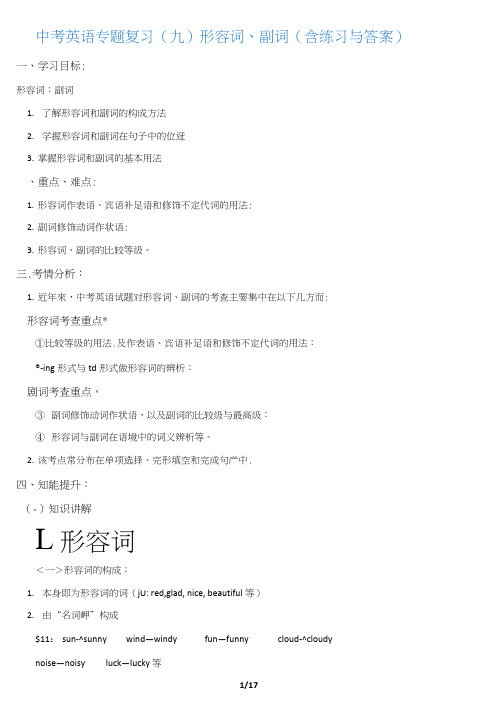
中考英语专题复习(九)形容词、副词(含练习与答案)一、学习目标:形容词:副词1.了解形容词和副词的构成方法2.学握形容词和副词在句子中的位迓3.掌握形容词和副词的基本用法、重点、难点:1.形容词作表语、宾语补足语和修饰不定代词的用法:2.副词修饰动词作状语:3.形容词、副词的比较等级。
三.考情分析:1.近年來,中考英语试题对形容词、副词的考査主要集中在以下几方而:形容词考查重点*①比较等级的用法.及作表语、宾语补足语和修饰不定代词的用法:®-ing形式与td形式做形容词的辨析:剧词考査重点,③副词修饰动词作状语,以及副词的比较级与最髙级:④形容词与副词在语境中的词义辨析等。
2.该考点常分布在单项选择、完形填空和完成句产中.四、知能提升:(-)知识讲解L形容词<一>形容词的构成:1.本身即为形容词的词(jU: red,glad, nice, beautiful等)2.由“名词岬”构成$11: sun-^sunny wind—windy fun—funny cloud-^cloudynoise—noisy luck—lucky 等3.形容词具仃独特的后缀形式主要右:-able, -ible, -al, -ical, -ant, -ary, -ful, -less, -ous 等.如:comfortable, terrible, national, natural, political, chemical, imports nt, pleasa nJ ordinary, necessary, beautiful, wonderful, careful^ hopeless, careless, famous^ dangerous 等。
4.以」y结尾的形容词如:friendly友好的:lonely孤独的:lovely可爱的:等v二〉形容词的用法及位置1.作定语形容词修饰名词时迓于名词Z前:修饰不定代词时,置于不定代词之后。
形容词副词讲义及练习
专题五形容词及副词知识摘要用法形容词的功能:定语、表语或宾语补足语用法副词功能:定语、表语或宾语补足语形容词和副词形容词与副词的转化形容词、副词的比较级与最高级的变化规律原级的用法形容词、副词的比较等级比较级的用法最高级的用法考点梳理考点一、形容词的用法及位置1、形容词的用法形容词是用来描写或修饰名词(或代词)的一类词。
在句子可做定语、表语或宾语补足语等。
Peter is tall. 彼得个子高。
(做表语)We must keep our room clean. 我们必修保持我们的房间干净。
(做宾补) 2.、形容词的位置(1) 形容词作定语时一般放在它所修饰的词的前面。
I think it’s an interesting book. 我认为它是一本有趣的书。
(2) 形容词修饰复合不定代词时放在复合不定代词之后。
She has something important to tell us. 她有重要的时期要告诉我们。
【知识拓展】2、以-ly结尾的形容词:friendly 友好的lonely 孤独的lovely 可爱的likely 可能的daily 日常的lively 有生气的考点二、副词的用法及位置1、副词的功能及用法副词是用来修饰动词、形容词、其它副词以及全句的词,在句子中可作状语、表语、定语和宾语补足语。
The students are working hard in the school. 学生们正在学校努力学校。
I’m afraid I must be off now. 恐怕我现在得走了。
2、副词的位置(1)修饰动词,多数位于动词之后,及动词的宾语之后。
She speaks English well. 她英语说得好。
(2)频度副词(always, never, often等)通常放在行为动词之前,情态动词、be动词、助动词之后。
但是sometimes 位置较灵活,他还可以放在句中的开头或结尾。
形容词和副词用法详解及练习(附答案)
形容词&副词教学目的:1. 掌握形容词和副词的比较等级用法;2. 了解比较级和最高级前的修饰语和倍数的表达;3. 能够识别常用形容词和副词的词义辨析;4. 学会使用形容词作表语、定语的句法功能及其所构成的固定句型结构;第一模块----高考要点形容词和副词在高考试题中始终占很重要的地位。
近几年高考对形容词和副词的考查具有“淡化语法、注重深层语义”的特点,以形容词和副词辨析为热点。
同时继续加强对形容词和副词比较等级的考查。
其考点主要包括:1.考查形容词和副词词义辨析。
如:rather, still, such, surprised, surprising, therefore, though, too, very, yet等。
2.考查形容词修饰名词时的词序,即指示代词/不定代词+数词(序数词、基数词)+描绘性形容词(nice, good, interesting, beautiful等)+特征性形容词(大小、长短、高低、形状、年龄、新旧)+颜色形容词+国籍、出处+物质、材料+用途、类别+中心名词。
3.考查形容词和副词比较等级的常用句型及其修饰成分在句中的位置。
如:三种常见的倍数表达法:(1)倍数+as+形容词或副词原级+as…;(2)倍数+the size/length/width/depth/height of…;(3)倍数+形容词或副词比较级+than+被比较对象。
4.考查与形容词和副词有关的习语结构。
如:more than, not more than, no more than, less than, not less than, no less than, other than, rather than,nothing else than“仅仅,只不过”,more than a little “非常,很”,more often than not “经常,在大多数情况下”,cannot(never, hardly)…too(enough)“无论……也不过分,越……越好”等。
中考英语专项复习专题【形容词、副词】(附例题以及答案)
中考英语专项复习专题【形容词、副词】(附例题以及答案)本章节内容1.形容词的基本作用2.形容词语境辨析3.形容词词组4.副词的基本作用5.副词语境辨析6.形容词、副词等级7.正确形式填空1 形容词的基本作用一、形容词的定义及位置形容词是用来描述或修饰名词或代词的一类词,用以说明人或事物的性质和特征。
1.作定语一般放在名词之前,复合不定代词之后。
He lives in a beautiful house.他住在一座漂亮的房子里。
There is nothing important in today’s newspaper.今天的报纸上没有什么重要的内容。
2.作表语,放在连系动词(be,feel,look,smell,taste,sound,get,become,keep,turn,seem 等)之后。
His idea sounds great.他的主意听起来很棒。
3.作宾语补足语,放在宾语之后,常与make,leave,keep,find等动词连用。
They keep the classroom clean every day.他们每天保持教室干净。
We find it important to learn English well.我们发现学好英语很重要。
4.形容词的名词化有些形容词放在定冠词之后变成名词,表示一类人,常见的有:good/bad,rich/poor,young/old,deaf/blind, black/white,living/dead等The old should be taken good care of.老年人应该受到很好的照顾。
2形容词词义辨析rich富有的↔ poor贫穷的happy高兴的↔ angry生气的short短的↔ long长的same相同的↔ different不同的3形容词短语辨析形容词短语在单项填空中考查词义辨析,在词组翻译中考查词义及拼写。
这就要求不仅要知道意思,还要能准确地写出来。
形容词和副词的用法及专项训练题
形容词和副词的用法及专项训练题英语王英语网 - 少儿英语专家作者:英语王教…文章来源:本站原创点击数:5516 更新时间:2006-6-1214:35:08形容词和副词的用法一、形容词1、形容词可分为两大类:描绘形容词和限定形容词。
描绘形容词是描写人或物的颜色、尺寸、形状、性质、状态等的形容词。
限定形容词用于限定被修饰词的数量、距离、所有关系等。
除了these和those外,形容词的单数与复数形式相同。
2、形容词的位置修饰语一般应置于被修饰语之前,但当几个形容词修饰同一名词时,其排列顺序一般如下:Example: that strong young Chinese swimmer注意:形容词前有as, so, no, too, how等词时,不定冠词应置于形容词之后。
She is too kind a girl to refuse.在下列情况下,修饰语应置于被修饰的名词后:(1)名词之后的数量词+名词+old, long, wide等。
a boy six years old, a street two kilometers long(2)为了加强语气或音调美,将描绘形容词置于名词之后。
He had a face thin and worn, but eager and resolute.(3)something, anything,everyone, anybody…+形容词。
There′s nothing wrong with the electric cooker.(4)作定语用的分词或形容词短语The judge has talked to all the people involved.3、“数词+名词”构成的形容词(1)数词+名词,如 a two-week tour, a ten-page report等。
(2)数词+名词+形容词,如 a seven-year-old boy等。
(3)名词(无冠词)+基数词=the+序数词+名词,如Unite 6=the Sixth Unite(4)“数量词+复数名词”作主语,虽然是复数形式,但仍然用单数动词,作为一个单位来表示。
- 1、下载文档前请自行甄别文档内容的完整性,平台不提供额外的编辑、内容补充、找答案等附加服务。
- 2、"仅部分预览"的文档,不可在线预览部分如存在完整性等问题,可反馈申请退款(可完整预览的文档不适用该条件!)。
- 3、如文档侵犯您的权益,请联系客服反馈,我们会尽快为您处理(人工客服工作时间:9:00-18:30)。
形容词和副词用法总结及练习一、形容词的用法:(一)概念:形容词修饰名词,说明事物或人的性质或特征,通常可将形容词分成性质形容词和叙述形容词两类,其位置不一定都放在名词前面。
1. 直接说明事物的性质或特征的形容词是性质形容词。
【难点】2. 叙述形容词只能作表语,所以又称为表语形容词,这类形容词大多数以a开头的形容词都属于这一类。
例如:afraid,asleep, awake,alone等。
(二)形容词的种类1. 品质形容词:英语中大量形容词属于这一类,他们表示人或物的品质,如:The play was boring. 那出戏很枯燥乏味。
You have an honest face. 你有一张诚实的脸。
2. 颜色形容词有少数表示颜色的形容词,如:She had on a blue coat. 她穿了一件蓝色的外套。
(3. -ing 形容词:有大量现在分词正在或已经变为形容词,如:4. –ed形容词:它们是由它们的过去分词变过来的,一般有被动意义,多数为品质形容词,如:She looked tired.5. 合成形容词:warm-hearted 热心的,heart-breaking 令人心碎的(三)形容词的用法和在句中的位置1、形容词在句中主要可用作:1)定语:What a fine day!2)表语:She looks happy.3)宾语的补语(构成合成宾语):Do you think it necessary 你认为这有必要吗?4)状语:He arrived home, hungry and tired.他又饿又累的回到家里。
2、形容词在句中的位置:有的形容词放在被修饰的名词之前,称为前置形容词;少数形容词放在被修饰的名词之后,称为后置形容词。
1)当名词被多个前置形容词修饰时,形容词之间有一个先后顺序问题。
一般规则为:(限定词)→一般描绘性形容词→表示大小、长短、高低的形容词→表示年龄、新旧的形容词→表示国籍、地区、出处的形容词→表示物质、材料的形容词→(名词)。
如:There is a famous fine old stone bridge near the village.村子附近有一座著名的漂亮的古代石桥。
【重点】2)当形容词词组相当于一个定语从句时,或形容词用来修饰somebody,something, anything, nothing 等的时候,便会出现后置形容词。
如:The boy interested in music is my brother. 对音乐赶兴趣的那个男孩是我弟弟。
Do you have anything interesting to tell us 你有什么趣闻告诉我们吗二、副词的用法:(一)概念:用以修饰动词、形容词或其他副词的词叫做副词。
例如:not(不),here(这里),now(现在)。
不少副词同时也可用作介词或其它词类。
如:Have you read this book before (副词,作时间状语) 你以前读过这本书吗?He will arrive before ten o’clock. (介词,before ten o’clock 是介词短语,作时间状语)他将在10点钟前到达。
(二)副词的种类1、时间副词有三类:always, often, usually, sometimes, never, ever, hardly等一般位于系动词、情态动词和助动词之后,实之前义动词1)表示发生时间的副词:It’s beginning to rain now! 现在开始下雨了!2)表示频繁程度的副词,也称频度副词always, often, usually, sometimes, never, ever, hardly等一般位于系动词、情态动词和助动词之后,实之前义动词:She often changes her mind. 她常改变主意。
3)还有一些其他表示时间的副词:He has just had an operation. 他刚动过手术。
2、地点副词:1)有不少表示地点的副词:She is studying abroad. 她在国外留学。
2)还有一些部分与介词同形的副词。
它们与介词同形,跟宾语的是介词,否则是副词:①用作介词:Stand up! 起立!②用作副词:A cat climbed up the tree. 猫爬上了树。
3)以where 构成的副词也是地点副词:It’s the same everywhere. 到处都一样。
《【重点】3、方式副词1)英语中有大量方式副词,说明行为方式(回答how的问题):How beautifully your wife dances. 你夫人舞跳的真美。
2)还有相当多的副词,表示某些情绪:She smiled gratefully. 她感激的笑了笑。
3)还有一些以-ly结尾的副词,表示动作发生的状况:He left the town secretly.他悄然离开了这座城市。
【重点】4、程度副词和强调副词1)程度副词可修饰动词,表示“到某种程度”:Is she badly hurt 她伤得重吗?[说明] 这类副词除修饰动词外,还可修饰形容词(a)或另一副词(b):a. fairly simple 相当简单quite correct 完全正确b. wonderfully well 好极了do it very quickly 干得很快【重点】2)much 是一个特殊的程度副词,它可以:a. 修饰形容词等:I’m not much good at singing. 我唱歌不太好。
b. 修饰比较级:You sing much better than me. 你比我唱的好多了。
Their house is much nicer than ours. 他们的房子比我们的好多了。
【重点】5. 疑问副词和连接副词1)疑问副词:疑问副词用来引导特殊问句:how: How is your grandmother 你奶奶身体好吗?where: Where does she come from 她是哪儿人?when: When can you come 你什么时候能来?why: Why was he so late 他为什么来得这么晚2)连接副词:连接副词意思和词形都和疑问副词一样,但都引导从句或与不定式连用:>how: Do you know how to start this machine 你知道这台机器怎样启动吗where:I don’t know where he lives. 我不知道他住在哪儿。
(引导宾语从句)when: Tell me when you’ll be ready. 告诉我你什么时候准备好。
(引导宾语从句)why: That’s why I came round. 这就是我来的原因。
(引导表语从句)6. 一些其它类型的副词,如表示方向的副词:Let’s go inside.咱们到里面去。
Take two steps forward. 向前走两步。
(三)副词的位置1. 副词修饰动词时,通常可以放在句首、句中或句末。
如:Usually I do my homework in the evening. (句首) 通常我晚上做家庭作业。
I often get up at six. (句中) 我常在6点起床。
Please speak slowly. (句末) 请慢慢说。
2. 副词修饰形容词或副词时,通常放在形容词或副词的前面如:These flowers are quite beautiful. (在形容词前)这些花相当漂亮。
He works very hard. (在副词前)他工作很努力。
▲但也有例外,如:She is old enough to go to school. (在形容词后)她已到了上学的年龄。
3. 按一般规则, 既有地点状语又有时间状语时,地点状语应放在时间状语之前。
如:We had a meeting in the classroom yesterday afternoon. 我们昨天下午在教室开了一个会。
He watched TV at home last night. 他昨晚在家看电视。
[说明] ①形容词一般修饰名词,副词一般修饰动词、形容词或副词。
②一些形容词后加上-ly可以变成副词,如slow-slowly, quick-quickly, careful-carefully等。
【基础练习】(一)用所给词的正确形式填空《1. The Greens are _____ (happy) to live in this _____(noise) street. They havedecided to move to another place.2. The panda has been ______ (die) for about two months.3. I like her dress. It looks very ______ (beauty).4. Don’t feel ______ (worry) about your child. The whole class wouldbe ______ (friend) to the new classmate.5. The ______ (finally) exams usually take place at the end of June.6. It’s _____ (possible) for an ordinary plane to fly to the moon.7. It’s a _____ (please) trip for all of us.8. The children in China are living a _____ (color) life.9. It was an _____ (amaze) match. It amazed us.felt very _____ (sleep) and fell ____ (sleep) soon when he lay in bed.<all had a very _____ (enjoy) time at the party.(二)选择最佳答案( )1. These oranges taste_______.A. goodB. wellC. to be goodD. to be well( )2. I can’t pay ________ as he asked for.A. a as high price a high price high price high a price( )3. — We are going to see a film this evening . Why not go with us ?— I have to do many things this evening . I’m _______ , you see .A. freeB. gladC. sorryD. busy( )4. —Mum, Bill is coming to dinner this evening.—OK. Let’s give him ___ to eat.A. something differentB. different anythingC. anything differentD. different something。
